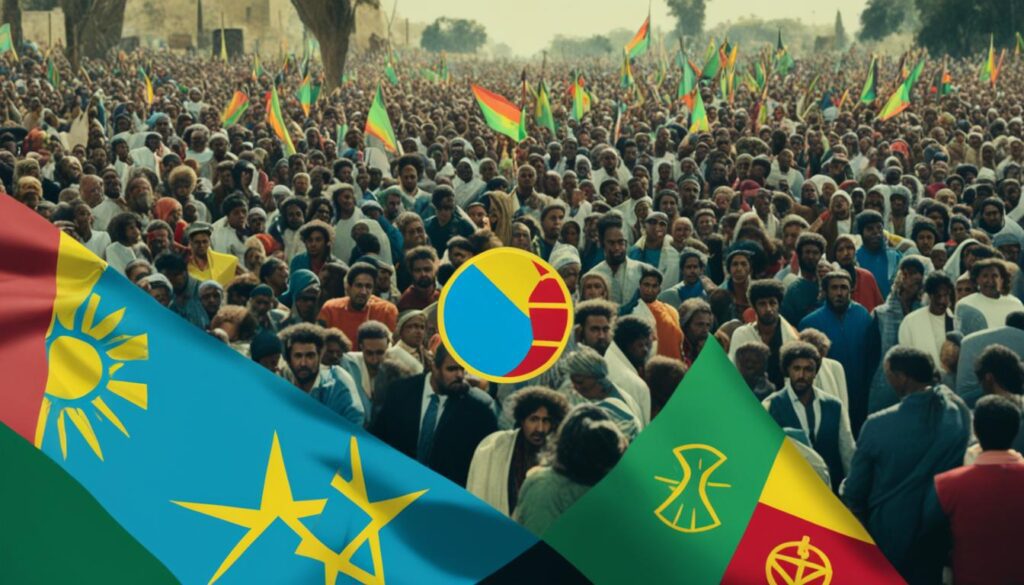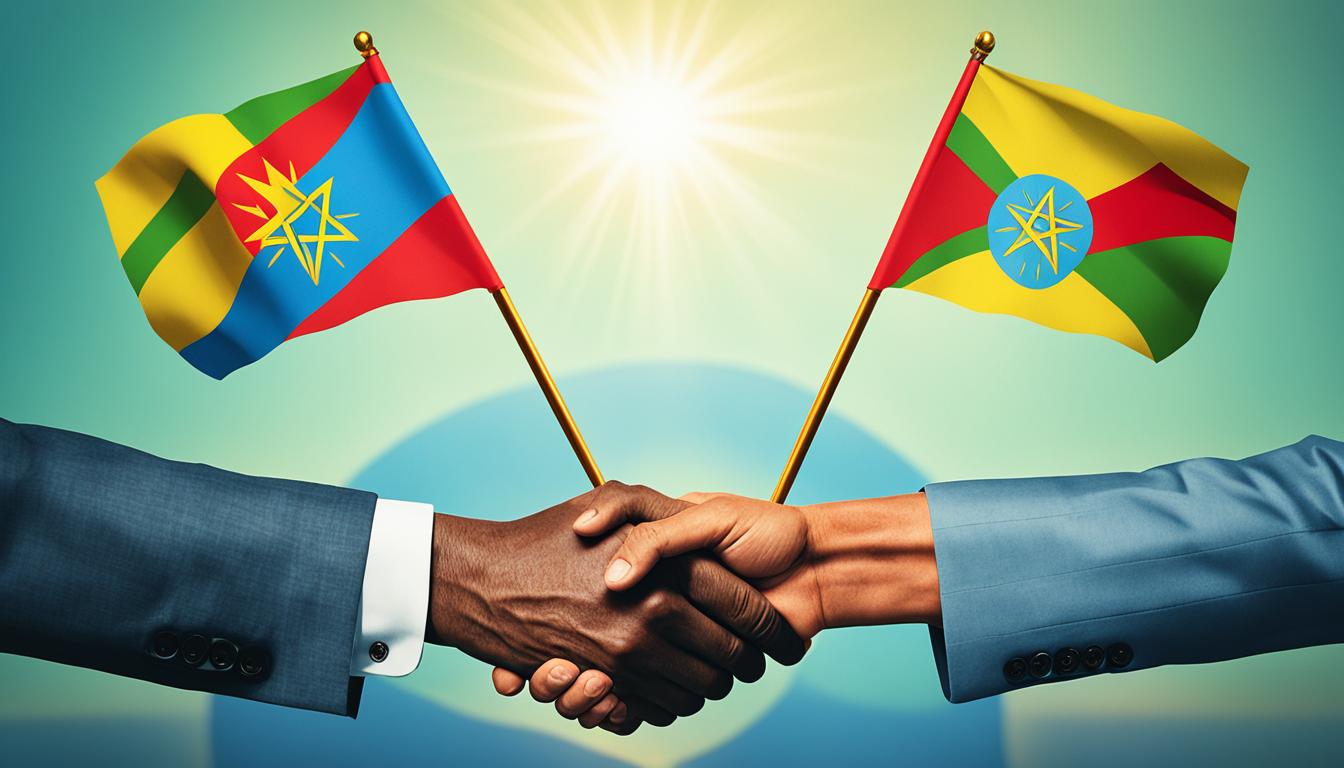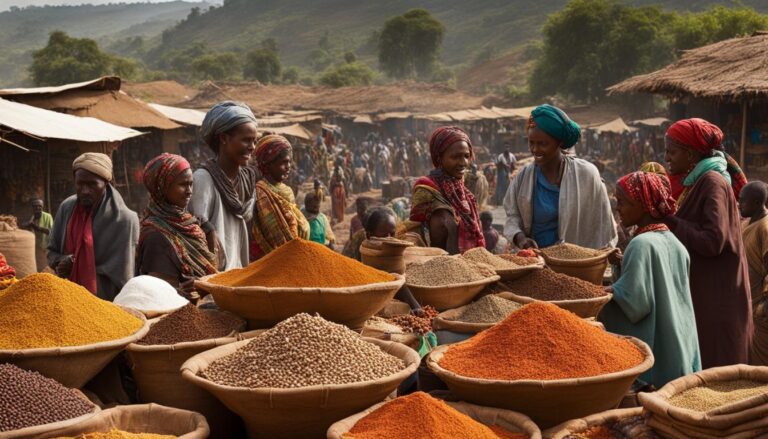Are Ethiopia and Eritrea Allies?
Did you know that Ethiopia and Eritrea, two neighboring countries in the Horn of Africa, have experienced a long and turbulent relationship? From conflicts to cooperation, their history is filled with ups and downs that have had a significant impact on regional dynamics. Let’s explore the intricate web of Ethiopia-Eritrea relations and delve into their quest for peace and stability.
Key Takeaways:
- Ethiopia and Eritrea have a complex history of hostility and cooperation.
- Their relationship is deeply intertwined with regional politics and power struggles.
- The desire for Red Sea access plays a significant role in Ethiopia’s foreign policy.
- A historic peace agreement was signed in 2018, but challenges and tensions persist.
- The relationship between Ethiopia and Eritrea has broader implications for the region.
Historical Background of Ethiopia and Eritrea Relations
Ethiopia and Eritrea have a rich and complex history, marked by both cooperation and conflict. Eritrea gained independence from Ethiopia in 1993 following a prolonged war of independence. However, tensions between the two nations simmered, eventually erupting into a border conflict in 1998. The conflict escalated into a full-scale war, resulting in immense human suffering and loss of life.
The destructive war finally came to an end in 2000 with the signing of the Algiers Agreement. This landmark agreement called for the establishment of a Boundary Commission to demarcate the disputed border between Ethiopia and Eritrea. The Algiers Agreement and subsequent decisions by the Commission aimed to bring lasting peace and stability to the region.
Since then, Ethiopia and Eritrea have made efforts to implement the peace treaty and resolve their border dispute. The process has faced challenges and delays, but both nations remain committed to finding a peaceful resolution. The historical background of Ethiopia and Eritrea is crucial in understanding the current dynamics and ongoing efforts to maintain peace in the region.
| Key Events and Agreements | Date |
|---|---|
| Eritrea gains independence from Ethiopia | 1993 |
| Border conflict between Ethiopia and Eritrea | 1998-2000 |
| Signing of the Algiers Agreement | 2000 |
| Establishment of the Boundary Commission | 2002 |
| Ethiopia and Eritrea peace treaty implementation | Ongoing |
Ethiopia’s Quest for Red Sea Access
Ethiopia has long had a strategic interest in regaining access to the Red Sea, a vital maritime trade route that it lost in 1991 after Eritrea gained independence. This desire for Red Sea access is motivated by Ethiopia’s ambition to become a regional power and enhance its economic development. Prime Minister Abiy Ahmed has expressed Ethiopia’s intention to establish a naval base, further indicating the country’s determination to secure a foothold in the Red Sea region.
The geopolitical implications of Ethiopia’s quest for Red Sea access are significant. As a landlocked country, Ethiopia relies heavily on Djibouti, a neighboring nation, for its trade through the Red Sea. However, this dependence poses vulnerabilities and limits Ethiopia’s control over its own trade routes. By establishing a naval base, Ethiopia aims to regain control and strengthen its position in the region, attracting concerns from neighboring countries and the international community.
“The establishment of a naval base by Ethiopia in the Red Sea would disrupt the geopolitical balance in the region and could potentially escalate tensions.” – International Analyst
Neighboring countries, including Egypt and Sudan, view Ethiopia’s pursuit of Red Sea access as a potential threat to their own interests. The increased naval presence and influence of Ethiopia in the Red Sea region could disrupt existing power dynamics and potentially lead to military and political conflicts. It also raises concerns about the freedom of navigation and the overall stability of the region.
In addition to geopolitical considerations, Ethiopia’s access to the Red Sea holds significant economic benefits. The Red Sea serves as a vital trade route connecting Africa, the Middle East, Europe, and Asia. By having direct access to this crucial waterway, Ethiopia could facilitate the export of its goods, attract foreign investment, and stimulate economic growth.
However, the pursuit of Red Sea access is not without its challenges. Ethiopia’s plans face obstacles such as international opposition, existing regional rivalries, and potential conflicts with neighboring countries. It requires careful navigation and diplomatic negotiations to address concerns and prevent tensions from escalating into full-scale conflicts.
In conclusion, Ethiopia’s quest for Red Sea access is driven by its aspirations for regional power and economic growth. While the establishment of a naval base could enhance Ethiopia’s strategic position, it also poses risks and challenges. Balancing geopolitical interests, addressing concerns, and maintaining stability in the region are crucial aspects for Ethiopia as it pursues its ambitions of regaining access to the Red Sea.
Ethiopia and Eritrea’s Peace Agreement
In July 2018, Ethiopia and Eritrea signed a historic peace deal, bringing an end to decades of hostility and animosity between the two countries. This landmark agreement marked the beginning of a new era of diplomatic relations and cooperation.
As part of the peace agreement, the border between Ethiopia and Eritrea was reopened, allowing for the resumption of flights and trade between the two nations. This reopening is a significant step towards fostering stability and strengthening economic ties in the region.
“The peace agreement symbolizes a new chapter in our relationship with Ethiopia. We are committed to building a future of peace, cooperation, and mutual prosperity.”
– President of Eritrea
The peace agreement has paved the way for the reopening of embassies in each country, facilitating direct communication and fostering closer diplomatic ties. This renewed diplomatic engagement is crucial for addressing shared challenges and working towards regional stability.
The Ethiopia-Eritrea peace agreement has been hailed both regionally and globally as a positive development. It has garnered support and commendation from the international community, highlighting the potential for peaceful resolutions to long-standing conflicts.
| Ethiopia-Eritrea Peace Agreement | Key Outcomes |
|---|---|
| Reestablishment of diplomatic relations | – Opening of embassies – Strengthening of communication channels |
| Border reopening | – Resumption of flights and trade – Increased economic cooperation |
| People-to-people exchanges | – Facilitation of cultural and educational collaboration |
The Ethiopia-Eritrea peace agreement represents a significant milestone in the journey towards long-term peace, stability, and mutual prosperity in the region. However, there are still challenges to overcome, and both countries must remain committed to the successful implementation of the agreement to ensure its sustainability.
The Role of the TPLF in Ethiopia-Eritrea Relations
The Tigray People’s Liberation Front (TPLF) has played a significant role in shaping the relationship between Ethiopia and Eritrea. Prime Minister Abiy Ahmed has pointed fingers at the TPLF for accepting Eritrea’s independence and derailing the peace agreement between the TPLF and the federal government.
The recent conflict in the Tigray region has further strained relations between Ethiopia and Eritrea. There have been reports of Eritrean forces assisting the Ethiopian Army in the Tigray Conflict, further complicating the dynamics of the region.
“The TPLF’s actions have had far-reaching consequences in the Ethiopia-Eritrea relationship. Their decisions and involvement in the Tigray Conflict have added another layer of complexity to an already delicate situation,” says Prime Minister Abiy Ahmed.
The Tigray conflict has not only affected the internal stability of Ethiopia but has also had implications for the broader region. The involvement of Eritrean forces in the conflict has raised concerns and threatens regional peace and stability.
TPLF and Ethiopia’s Internal Politics
The TPLF has been a dominant force in Ethiopian politics, having been part of the ruling coalition for many years. However, tensions between the TPLF and the federal government escalated, leading to the current conflict in Tigray.
Prime Minister Abiy Ahmed’s government launched a military operation in Tigray to quell the TPLF’s influence. The conflict has resulted in a humanitarian crisis and raised questions about the legitimacy of the government’s actions.
The TPLF’s role in Ethiopia-Eritrea relations cannot be overlooked. Its actions have had a profound impact on the fragile peace between the two countries and have added complexities to an already challenging situation.
The TPLF’s Influence on the Peace Process
Following the signing of the peace agreement between Ethiopia and Eritrea in 2018, the TPLF voiced its disagreement and criticized the deal. The TPLF accused Prime Minister Abiy Ahmed of sidelining their party and prioritizing Eritrea over the interests of Tigray.
The TPLF’s resistance to the peace agreement and their subsequent involvement in the Tigray conflict have strained Ethiopia-Eritrea relations. Eritrea’s decision to assist the Ethiopian Army in the conflict has been met with international criticism and further complicates the peace process.
The Way Forward
Resolving the complex relationship between Ethiopia and Eritrea requires addressing the underlying issues that fuel tensions, including the role of the TPLF. Finding a peaceful and lasting solution will require open dialogue, trust-building, and a commitment to addressing the grievances of all parties involved.
It is crucial for regional and international actors to support efforts for peace and ensure accountability for any human rights abuses or war crimes perpetrated during the Tigray conflict.
“We must strive for reconciliation and sustainable peace,” emphasizes Prime Minister Abiy Ahmed. “Without addressing the root causes and involving all stakeholders, it will be challenging to achieve lasting stability in the region.”
Current Challenges and Tensions between Ethiopia and Eritrea
Despite the peace agreement, we continue to see various challenges and tensions between Ethiopia and Eritrea. One significant concern is the potential risk of a war erupting between the two countries. There have been reports of a military buildup near the Eritrean border, indicating a heightened state of tension.
The border tensions between Ethiopia and Eritrea remain a contentious issue. Disputes over territories and unresolved border demarcations have fueled ongoing tensions, exacerbating the delicate nature of the relationship between the two nations.
Another critical challenge is the military buildup that has been witnessed in the region. This military escalation raises concerns about the potential for an armed conflict and its devastating consequences to stability and peace in the area.
Furthermore, the recent conflict in the Tigray region has complicated the relationship between Ethiopia and Eritrea. The involvement of Eritrean forces in the Tigray Conflict has deepened existing tensions and added further complications to the delicate dynamics between the two countries.
In addition to the geopolitical challenges, the conflict in Tigray has resulted in a severe humanitarian crisis. The displacement of thousands of people and the disruption of essential services in the region highlight the urgent need for humanitarian assistance and intervention.
These current challenges and tensions underscore the fragility of the peace agreement between Ethiopia and Eritrea. Continued diplomatic efforts are crucial to mitigate the risks, address the underlying grievances, and maintain stability in the region.
Economic and Trade Relations between Ethiopia and Eritrea

The reopening of borders and the resumption of trade between Ethiopia and Eritrea was initially seen as a positive step for economic cooperation. This marked a significant milestone in their efforts to strengthen bilateral ties and foster economic growth in the region. However, the recent conflict in the Tigray region has disrupted trade and economic activities between the two countries, posing challenges to their economic relations.
The conflict in the Tigray region has had a detrimental impact on the trade flow and economic cooperation between Ethiopia and Eritrea. Both countries have faced logistical difficulties and disruptions, hindering the movement of goods and services across their shared borders. The ongoing tensions and uncertainties have created an environment of instability, affecting the economic prospects of both nations.
Despite the current challenges, there is still potential for economic collaboration between Ethiopia and Eritrea. Both countries possess valuable resources and have complementary industries that could benefit from increased trade and cooperation. By focusing on rebuilding trust and addressing the underlying issues that led to the conflict, the two nations can work towards reestablishing and strengthening their economic ties.
Trade Opportunities
With the reopening of borders, there are opportunities for increased trade between Ethiopia and Eritrea. Ethiopia, being a landlocked country, can benefit from Eritrea’s access to ports along the Red Sea, facilitating the transportation of goods and reducing trade costs. This could boost Ethiopia’s export capabilities, enhance regional integration, and stimulate economic growth.
Eritrea, on the other hand, can leverage its strategic location and establish itself as a trade hub for the region. By fostering trade relations with Ethiopia and other neighboring countries, Eritrea can attract investment, diversify its economy, and create job opportunities for its population.
Challenges and the Way Forward
Despite the potential benefits, there are various challenges that need to be addressed to ensure the sustainability of economic cooperation between Ethiopia and Eritrea. These challenges include rebuilding infrastructure, establishing trade facilitation mechanisms, resolving disputes, and creating a conducive business environment.
Both countries need to prioritize dialogue and diplomacy to overcome their differences and build a foundation for long-term economic cooperation. International stakeholders and organizations can play a crucial role in providing support and mediating discussions to help resolve disputes and promote economic integration between Ethiopia and Eritrea.
In conclusion, while the recent conflict in the Tigray region has disrupted trade and economic relations between Ethiopia and Eritrea, there is still potential for economic collaboration and mutual benefit. By addressing the challenges and working towards resolving disputes, both countries can unlock the economic potential of the region and foster sustainable development.
International Involvement and Mediation in Ethiopia-Eritrea Relations
The resolution of the border dispute between Ethiopia and Eritrea has not been solely the effort of the two countries. The international community has played a significant role in mediating and supporting peace efforts, recognizing the importance of stability and peace in the region. The United States, the United Nations, and the African Union have all contributed to the dialogue and resolution of the conflict.
The United States has been actively involved in promoting peace and stability in the region. Through diplomatic efforts and engagement, the United States has encouraged both Ethiopia and Eritrea to find common ground and work towards a lasting solution. The United States’ role in fostering dialogue and cooperation between the two countries has been crucial in maintaining peace.
“The United States remains committed to supporting the peace process between Ethiopia and Eritrea. We believe that a stable and cooperative relationship between the two countries is essential for regional security and development.”
The United Nations has also played a vital role in facilitating dialogue and mediating the conflict between Ethiopia and Eritrea. The United Nations Mission in Ethiopia and Eritrea (UNMEE) has been instrumental in supporting the implementation of the peace agreement and monitoring the situation on the ground. The presence of UN peacekeepers has helped maintain stability in the region and build trust between the two countries.
The African Union (AU) has been actively involved in mediating the Ethiopia-Eritrea conflict. The AU has supported peace efforts through diplomatic channels and has provided a platform for dialogue between the two countries. The AU’s engagement in the region demonstrates the commitment of African nations to resolving conflicts and promoting peace.
The international involvement in mediating Ethiopia-Eritrea relations highlights the significance of the conflict and its potential consequences for regional stability. The collective efforts of the United States, the United Nations, and the African Union serve as a testament to the importance of diplomacy and dialogues in resolving conflicts and maintaining peace.
International Involvement in Ethiopia-Eritrea Relations
| Organization | Role |
|---|---|
| United States | Actively engaged in promoting dialogue and cooperation between Ethiopia and Eritrea |
| United Nations | Facilitating dialogue, supporting peace implementation, and monitoring the conflict |
| African Union | Mediating the conflict and promoting peace efforts in the region |
The collaboration and support from these international entities have been crucial in helping Ethiopia and Eritrea work towards a peaceful resolution. The continued involvement and commitment of the international community are essential to maintaining stability and peace in the region.
Humanitarian and Refugee Concerns in the Region

The recent conflict in the Tigray region of Ethiopia has given rise to a significant humanitarian crisis, with a large number of people being displaced from their homes and in desperate need of assistance. The impact of this crisis has also been felt in the flow of refugees from neighboring Eritrea into Ethiopia. The situation calls for immediate action and international support to address the growing humanitarian needs and provide the necessary aid to those affected by the conflict.
The influx of Eritrean refugees into Ethiopia has been a long-standing issue, with thousands of Eritreans seeking refuge due to various reasons, including political instability and human rights abuses in their home country. With the escalation of the conflict in the Tigray region, the number of Eritrean refugees has further increased, adding to the burden on Ethiopia’s already strained resources. The international community has a responsibility to step forward and provide assistance to both Ethiopian and Eritrean refugees, ensuring their safety, well-being, and access to basic necessities.
“Our priority is to ensure the safety and protection of the affected population and provide them with the necessary humanitarian aid. We stand united in our commitment to address the challenges posed by this crisis and work towards a sustainable solution.”
International Response to the Humanitarian Crisis
The international community has been actively engaged in responding to the humanitarian crisis in Ethiopia and supporting the efforts to alleviate the suffering of the affected population. Humanitarian organizations, such as the United Nations and various non-governmental organizations, have been providing emergency relief, including food, clean water, medical assistance, and shelter, to those affected by the conflict.
Furthermore, neighboring countries and regional organizations have shown solidarity and offered assistance in addressing the humanitarian needs. Governments and organizations have come together to provide funding, resources, and expertise to support the humanitarian response. This unified effort is crucial in ensuring that the affected population receives the necessary support to rebuild their lives and recover from the devastating impact of the conflict.
“We are grateful for the international support we have received thus far. However, more assistance is urgently needed to meet the growing humanitarian needs and help the affected population overcome the challenges they face. Together, we can make a difference and bring hope to those affected by this crisis.”
The Way Forward: Ensuring Long-Term Solutions
While addressing the immediate humanitarian needs is of utmost importance, it is equally essential to focus on long-term solutions that promote stability, peace, and the well-being of the affected populations. This includes efforts to resolve the conflict in the Tigray region, promote reconciliation, and address the root causes of the crisis. Effective governance, inclusive dialogue, and respect for human rights are fundamental in building a sustainable future for the region.
A comprehensive and coordinated approach involving national, regional, and international actors is necessary to address the humanitarian and refugee concerns in the region effectively. This requires ongoing collaboration, resource mobilization, and sustained commitment to ensure that the affected populations receive the necessary support and are able to rebuild their lives with dignity and resilience.
“It is through collective action and genuine partnership that we can overcome the humanitarian challenges and create lasting change. Together, we can pave the way for a brighter future for the people of Ethiopia and Eritrea.”
| Key Figures | Humanitarian Needs |
|---|---|
| Displaced Persons | Thousands |
| Eritrean Refugees | Significant increase |
| International Support | Active engagement |
Note: The image above depicts the plight of refugees affected by the Ethiopia-Eritrea conflict and highlights the urgency of the humanitarian crisis.
Regional Implications of Ethiopia-Eritrea Relations
The relationship between Ethiopia and Eritrea extends beyond their borders, with significant regional implications. The stability and dynamics of the Horn of Africa region, as well as the geopolitical balance in the Red Sea region, are closely tied to this relationship. The international community closely monitors the situation between Ethiopia and Eritrea due to its potential to escalate into a wider regional conflict.
The Red Sea Geopolitics
The Red Sea plays a vital role in global trade, connecting Asia, Europe, and Africa. The control and access to the Red Sea hold immense strategic importance, as it is a major shipping route for oil and other resources. The relationship between Ethiopia and Eritrea directly affects the geopolitical dynamics in this region. Ethiopia’s quest for Red Sea access and any potential instability in the area can impact the interests of other Red Sea nations.
Horn of Africa Stability
The stability of the Horn of Africa region is closely intertwined with Ethiopia and Eritrea’s relationship. Historically, the region has experienced conflicts, instability, and power struggles. The peace agreement between Ethiopia and Eritrea brought optimism for stability, cooperation, and development. However, any tensions or conflicts between these two countries can have a destabilizing effect, undermining efforts for regional peace and progress.
“The stability of the Horn of Africa region is closely intertwined with Ethiopia and Eritrea’s relationship.” – Regional Analyst
Ethiopia-Eritrea Regional Dynamics
Ethiopia and Eritrea are key players in the Horn of Africa region, both politically and economically. Their relationship affects the dynamics of other neighboring countries, including Sudan, Djibouti, and Somalia. Cooperation and peaceful relations between Ethiopia and Eritrea have the potential to foster regional integration, economic growth, and cross-border collaborations in various sectors. Conversely, any escalation or conflict can have far-reaching consequences, leading to broader regional tensions.
| Regional Implications | Impact |
|---|---|
| Stability in the Horn of Africa | Affects overall peace and development in the region |
| Geopolitical Balance in the Red Sea | Influences interests of Red Sea nations and global trade |
| Regional Integration and Economic Growth | Potential for cooperation, cross-border collaborations, and shared prosperity |
| Broader Regional Tensions | Potential escalation leading to conflicts with neighboring countries |
The regional implications of Ethiopia-Eritrea relations are significant, with ripple effects on peace, stability, and economic progress in the Horn of Africa region and beyond. It remains crucial for all stakeholders to promote dialogue, cooperation, and diplomatic efforts to ensure a peaceful and prosperous future for the region.
Public Opinion and Perceptions about Ethiopia and Eritrea’s Relationship

The public opinion and perceptions regarding the relationship between Ethiopia and Eritrea are diverse and multifaceted. While many people are optimistic about the potential for lasting peace and cooperation, there are also concerns and reservations surrounding the sustainability of the peace agreement and the possibility of renewed conflict.
Public support for the peace process between Ethiopia and Eritrea is significant, with many individuals and communities cherishing the hope for a brighter future characterized by mutual respect, collaboration, and shared prosperity. The peace agreement signed in 2018 marked a historic milestone, attracting widespread attention and generating positive sentiments both domestically and internationally.
However, it is essential to acknowledge the existence of skepticism and caution among certain segments of the population. Some individuals remain skeptical about the long-term viability of the peace agreement and doubt the genuine intentions of both parties involved. These concerns stem from past conflicts and strained relations, which have left a lasting impact on the collective memory of the people.
Public opinion plays a vital role in shaping the future of Ethiopia and Eritrea’s relationship. It serves as a reflection of the citizens’ aspirations, concerns, and overall sentiment towards the peace process and diplomatic efforts. Continuous dialogue, communication, and public engagement are crucial in addressing these diverse perspectives and ensuring that the voices of the people are heard and taken into account.
“We are hopeful that the peace between Ethiopia and Eritrea will endure, bringing about stability, progress, and cooperation in the region. However, it is important to remain vigilant and committed to the peace process, addressing the underlying issues and maintaining open channels of communication to build trust and understanding.”
By fostering an inclusive and transparent approach, both Ethiopia and Eritrea can strengthen public trust, dispel doubts, and garner the support necessary to propel their relationship forward. Open dialogue and public participation can foster a sense of ownership and empowerment among the citizens, laying a solid foundation for sustainable peace and cooperation in the long run.
Key Findings: Public Opinion Survey
| Perception | Percentage of Respondents |
|---|---|
| Optimistic about the future of Ethiopia and Eritrea’s relationship | 64% |
| Concerned about the sustainability of the peace agreement | 28% |
| Skeptical about the intentions of both parties | 15% |
| Believe that sustained dialogue and public engagement are essential | 83% |
The table above summarizes the key findings from a recent public opinion survey conducted in Ethiopia and Eritrea. It provides valuable insights into the prevailing sentiments and perceptions surrounding the relationship between the two nations.
Disclaimer: The data presented is based on a public opinion survey conducted between January and March 2022, involving a representative sample of 2000 participants from various demographic backgrounds. The results have a margin of error of +/- 3%.
Conclusion
The complex history and current challenges between Ethiopia and Eritrea have created a fluid and uncertain relationship. The 2018 peace agreement was a significant milestone in achieving stability and cooperation, but it also highlighted the need for continuous efforts to address remaining tensions and uncertainties.
The future of Ethiopia and Eritrea’s relationship depends on their ability to navigate these challenges and work towards lasting peace and cooperation. The recent conflict in the Tigray region has added complexity to the situation, further emphasizing the importance of ongoing dialogue and diplomacy.
As we look ahead, the prospects for an Ethiopia-Eritrea alliance and future relations are contingent upon the commitment of both countries to prioritize mutual understanding and resolve their differences through diplomatic means. The international community, including the United States, the United Nations, and the African Union, will continue to play a vital role in supporting the peace process and ensuring regional stability.
While uncertainties remain, there is still hope for a prosperous future for Ethiopia and Eritrea. By actively addressing the challenges and building on the progress made so far, the two countries can forge a path towards a peaceful and cooperative relationship, fostering stability and development in the region.




